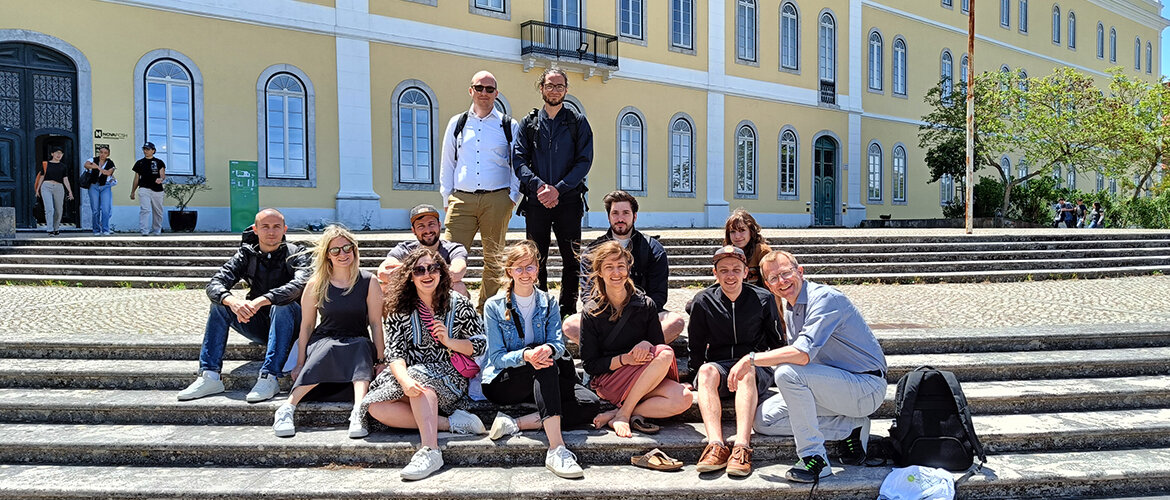Study trip to Lisbon: unicorns and coding schools
- 21.06.2023
- International

Students on the Master's program in Web Communications & Information Systems visiting the Universidade NOVA de Lisboa.
Students in the Web Communication & Information Systems master's program spent a week in the Portuguese capital and visited numerous companies.
Day 1: ADVANTAGE AUSTRIA | 42 CODING SCHOOL | START-UP LISBOA
To kick off their week-long trip, the students visited the office of Advantage Austria, the foreign trade organization of the Austrian Federal Economic Chamber. Esther Maca, João Gomes and Christina Riediger introduced the group to the special features of the country and the Portuguese economy – a helpful prelude to the upcoming program.
Next on the program was a visit to the 42 Coding School – also known internally as the future of education – at its recently opened location in Lisbon. Here, the Kufstein students gained exciting insights into alternative ways of learning how to program. Two 18-year-old students from Ukraine accompanied the tour group and gave them a tour of the premises. The large shared office not only had work areas, but also areas for playing table tennis and relaxing, as well as a large roof terrace that is available to all students of the 42 Coding School during the day. The educational institution's concept is based on project-based learning, in which students can complete their projects and tests at their own pace. The training is free of charge, but students are responsible for their own learning progress.
In the adjoining rooms, the students visited another Portuguese start-up: Miles In The Sky. One of the founders, Ricardo Pereira, explained the approach of the young company, which supports modern education with a range of tools and services for various organizations in a very agile way.
The last stop for the first day was Start-Up Lisboa, a hub for many successful company start-ups. Pedro Teixeira reported on the history, current status and future of the approach to supporting companies that are either founded in Lisbon or come to Lisbon to expand their business. The students were impressed to learn that the city has produced so many successful small and large companies that it even refers to itself as a unicorn factory. A unicorn is a start-up with a valuation of over one billion US dollars that is not traded on the stock exchange.
Day 2: Outsystems
Having already learned about the concept of Portuguese unicorns, the study group had the opportunity to visit one on the second day. The group was hosted by Outsystems, a company that originated in Portugal but now operates globally and specializes in low-code solutions. One of the founders, Rodrigo Sousa Coutinho, explained the history of Outsystems from its beginnings to the present day to the inquisitive in a very welcoming and authentic way. Rodrigo emphasized that the product solves a central problem of the tech world and that he himself wonders why no one before them came up with the idea of offering a low-code platform of this kind. Sofia Alves, Senior Director for People Development, then gave interesting insights into the company's culture, and the lively discussion with the students shed light on the workings of unicorn companies. It was remarkable that the corporate culture is not perceived as abstract by the employees, but that the key values that the company lives by were written down in a book by the founders themselves.
Day 3: UNIVERSIDADE NOVA DE LISBOA | AGAP2IT
On the third day, the students explored the academic world in Lisbon with a visit to the Information Management School (ISM) at NOVA Universidade Lisboa. The group had the opportunity to get some insights into the academic programs and research activities of ISM and to compare them with the education system and programs in Austria. It was not surprising that a number of similarities could be found, but also some differences. What surprised the students the most was that all courses are taught in English. When 100 percent of the class speaks Portuguese, the lessons are sometimes in their mother tongue, but the materials and the exam are still in English.
After lunch, the group visited agap2IT, a company of the MoOngy Group. After a tour of the inspiringly designed offices, Goncalo Roque explained in detail the services and products of the company, which offers, among other things, outsourcing services and turnkey solutions. It was interesting to learn that the company name A Gap in IT reflects the founders' perception at the time, as well as to hear about the company's expansion into various European countries and the challenges that came with it.
Day 4: Accenture
On the fourth day, the trip went to a modern part of Lisbon that was built during the 1998 World's Fair in the capital. Nowadays, the area is a modern business district with shopping malls, tourist attractions and the venue of the WebSummit, one of the most important annual technology conferences. The group set out to meet the Portuguese branch of the global consulting firm Accenture in their newly opened offices in the Exeo Lumio building. Mariana Reis and her colleagues introduced the students to the world of technology consulting and generously took time for all questions before presenting their modern office space, which offered an open atmosphere with flexible working options and a roof terrace with spectacular views of the surrounding area. The day ended at the Platz der Nationen – a fitting symbol for the overall idea of the study trip.
Link:
- About the Web Engineering & IT Solutions program
